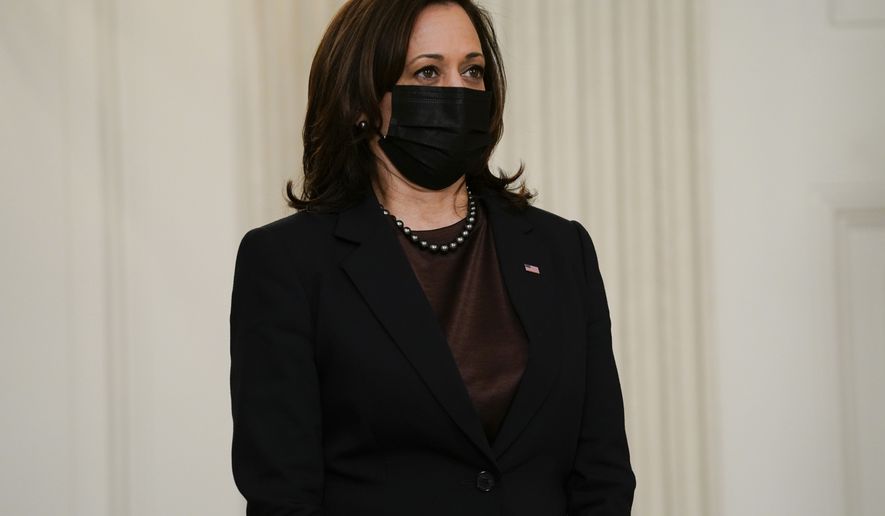Vice President Kamala Harris, who has been a champion of the #MeToo movement, isn’t saying anything about the increasing number of women accusing New York Gov. Andrew Cuomo of sexual harassment.
She’s letting the White House’s spokeswoman do the talking for her.
“I certainly can speak on behalf of the president and vice president,” White House press secretary Jen Psaki told reporters Tuesday when asked about Ms. Harris’ silence. “They both believe that every woman coming forward should be heard, should be treated with dignity and treated with respect.”
Ms. Harris took a leading role in speaking out in support of women who made sexual harassment allegations against Supreme Court Justice Brett M. Kavanaugh and Democratic Sen. Al Franken of Minnesota, whom she wanted to block from confirmation and oust from the Senate, respectively.
The list is growing of women saying Mr. Cuomo made unwelcome sexual advances in the workplace and elsewhere.
Anna Ruch, a former member of the Obama administration and the Biden 2020 campaign, accused Mr. Cuomo of putting his hands on her and asking for a kiss at a wedding reception in 2019, according to a report in The New York Times.
The three-term governor also is facing other sexual harassment allegations from two former aides.
Mr. Cuomo, a Democrat, this week turned the matter over to state Attorney General Letitia James to investigate, but calls are mounting from Democratic state lawmakers for him to resign.
Mr. Cuomo has denied wrongdoing and issued an apology that has been slammed by critics for not being a real apology.
“I acknowledge some of the things I have said have been misinterpreted as an unwanted flirtation. To the extent anyone felt that way, I am truly sorry about that,” he said in his statement.
Ms. Ruch, now 33, met Mr. Cuomo at a friend’s wedding reception and was shocked when he put his hand on her bare lower back, according to the Times.
When she removed his hand, Mr. Cuomo responded that she was being “aggressive,” put his hands on her cheeks, and asked her: “Can I kiss you?”
“I was so confused and shocked and embarrassed,” Ms. Ruch told the Times. “I turned my head away and didn’t have words in that moment.”
Last week, Lindsey Boylan, a former aide who resigned in 2018, published a lengthy essay saying Mr. Cuomo invited her to play strip poker during a flight home from an event and accused him of creating “a culture within his administration where sexual harassment and bullying is so pervasive that it is not only condoned but expected.”
Ms. Boylan said he went out of his way to “touch me on my lower back, arms and legs” and one day abruptly kissed her on the lips in his office.
Another woman, Charlotte Bennett, an executive assistant to the governor, said Mr. Cuomo asked her about her sex life and whether she was open to having relationships with older men. Ms. Bennett, 25, said Mr. Cuomo said he was lonely during the pandemic, asking her, “Who did I last hug?”
“I understood that the governor wanted to sleep with me, and felt horribly uncomfortable and scared,” Ms. Bennett told the newspaper.
The accusations have put the White House in an awkward position and raised questions about how Ms. Harris squares her reluctance to pick sides after she eagerly weighed in on previous allegations against other men.
“I believe her,” Ms. Harris said of the sexual assault allegation Christine Blasey Ford made against Justice Kavanaugh during his 2018 confirmation hearing. Ms. Ford said he had assaulted her when they were in high school, which he vehemently denied.
Ms. Harris, the following year, said she believed the four women who accused President Biden of inappropriate touching.
She veered in a different direction in 2020 when Tara Reade accused Mr. Biden of pushing her up against a wall, kissing her and putting his hand down her skirt.
“I think that he has answered the questions directly and honestly and I am always going to fight for any survivor’s right to be heard without judgment,” Ms. Harris said at the time. “There should always be an opportunity for her to do that — or him to do that — in a way they are not only not judged but encouraged to come forward.”
• Seth McLaughlin can be reached at smclaughlin@washingtontimes.com.




Please read our comment policy before commenting.